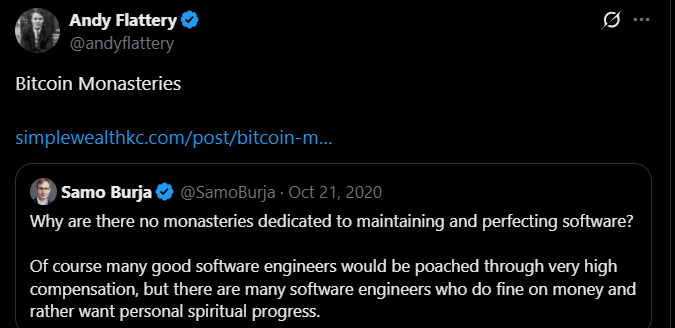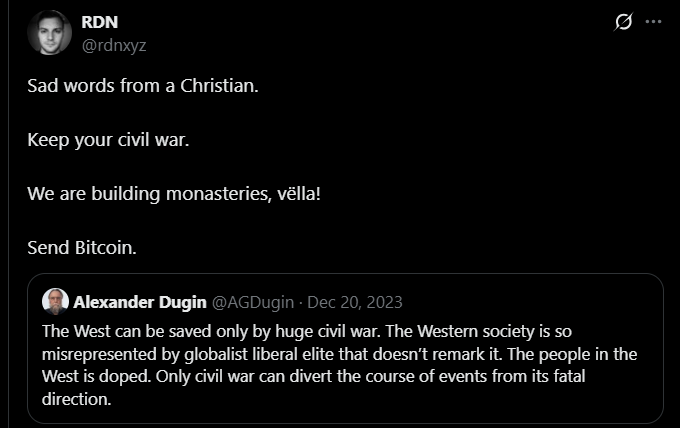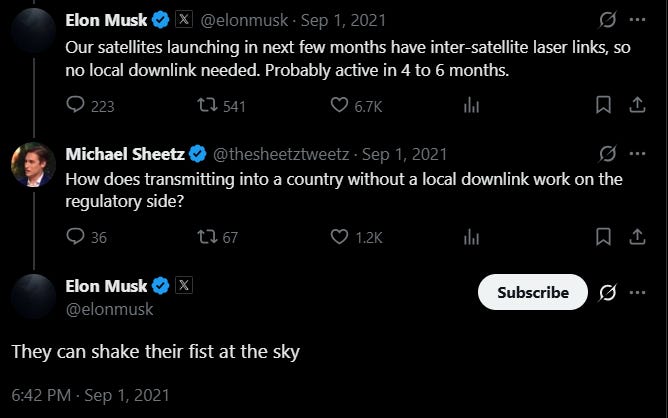Should you still care about a Network State with Trump 47 in control?
ISPs as the single point of failure and Surveillance Realism
Balaji wants you to join / make a Network State. If you read Balaji's stuff, he wants to solve three issues: loneliness ('bowling alone'), blue tribe overreach , and reliance on central banks.
He says that those tendencies will escalate unless we exit to network states. Have those tendencies stopped now, under Trump 47? TNS was published on the 4th of July 2022, under the Democrat Biden administration. Should you read it now? Will it "save Western civilization"? Is it the best direction for crypto? If you read it, should you apply it?
Is his recipe still relevant in 2025? Let's inspect his solution more. Quotations from The Network State unless stated otherwise.
solution inspection
The keywords in the book are 'crowdfunding', 'cryptocurrency', and a set of safehouses listed on the blockchain that represent the network state physically, as well as a metaverse VR town hall for meetings.
His description:
A network state is a social network with a moral innovation, a sense of national consciousness, a recognized founder, a capacity for collective action, an in-person level of civility, an integrated cryptocurrency, a consensual government limited by a social smart contract, an archipelago of crowdfunded physical territories, a virtual capital, and an on-chain census that proves a large enough population, income, and real-estate footprint to attain a measure of diplomatic recognition.
What you should consider here (and what Balaji is not telling you) is what is the null hypothesis in the scenario where there are no network states. He says the American Empire may fall. What is the baseline result of the aftermath when an empire falls? Barbarians, warlords, and pockets of the lost high civilization hiding in safer locations. The latter are usually monasteries.
How would this look for the fall of the US empire? Dear Reader, you might have run across this speculation or have your own, please share in the comments.
My first guess would be warlords as the leading companies making a three way alliances with specific states and cities and mercenaries / police forces, barbarians the fentanyl addicts and small criminals, and finally bitcoin monasteries - see:
https://x.com/andyflattery/status/1800197599468900434
https://x.com/rdnxyz/status/1737870429488820694
You might say that barbarians are less imposing than the average fall of Han / Rome scenario but we have a more aging population.
That default hypothesis probably does not sound that bad to you. Now you're either American or you're not, this might change things slightly.
Four scenarios
Now let's see the initial three issues: loneliness ('bowling alone'), blue tribe overreach, and reliance on central banks, and compare how they fare in the scenarios.
There are four possible scenarios. To think of it now, the visionaries don't like that phrasing as they prefer inevitability.
The first one is continuation of the status quo, no network states. The second one is empire collapse, no network states. The third one is status quo, with network states. The fourth one is empire collapse with network states.
If Trump was assassinated in 2025 we might have got the empire collapse one, so we see that the timeline has stabilized. Even if Trump lived and lost, Kamala Harris would be president - Balaji would probably say a Democrat victory accelerates the empire collapse.
Now projects like his operate on the principle of secure and attractive inside and dangerous and unattractive outside. For sure empire collapse would bring a great differentiation among possible outcomes in different regions. Some would be better off than under the imperial yoke, some would fall down even faster than they do now. That's at least for regular people. For the network state to be appealing, the outside needs to be more dangerous than the inside for the people, but for the network state to survive the outside should have no means / incentive to invade and destroy the network state.
Fragmented states would have more internal issues and less concentrated capital to devote to look for small fish like a network state. Still KGB was powerful after the USSR fell, and even if the US empire fell, the UK and Israel wouldn't and the agencies in those countries - MI6 and Mossad would certainly have the network states under radar. With public census on a blockchain, the network state would be easy to monitor and put moles into. Well, that's true even for continuation of the status quo, so the difference seems to be the incentive of the people to join the network state. With fragmentation, and a slow creation of a yet new world order, it would be multipolar and many new split off states would try to get recognition, making for an easier case for a network state to also achieve international recognition.
Going back to the four scenarios and three issues. Political fragmentation on the map might bring people together on its own, as well as economic disruption - maybe a synthetic solution like a network state(NS) would not be needed? Central banks are an interesting one - those numerous new entities would each need a new currency, backed by gold - or maybe bitcoin - seems that in the Fall of America we get global 'BTC as reserve currency' by default. This is getting interesting, you see? Blue tribe overreach - that depends on the fate of the UN, NYT and a couple of other institutions - but overall new borders would likely limit overreach of the coastal blue tribe elites, solving this too. From this it seems to solve those three issues. Your time is better spent trying to bring down the fall of the United States than to build a NS. Let's discuss the 'network state under status quo' scenario though.
Your time is better spent trying to bring down the fall of the United States than to build a Network State.
The loneliness depends on the network state implementation - a purpose-focused DAO that one spends some hours in discord every week is not enough to fix that. The blue tribe overreach - that might just gotten solved with Trump 47 the most. Central banks? They now want to use bitcoin as a reserve currency too! That might be just for show now, but for that again regular b2b business transactions in crypto are the barrier, and dispute resolution (see kleros) are all without something as big as a network state as a necessary condition of their existence.
Hmm, it looks like that network state is not as useful after all?
Is it any good though if it delivers those 3 things as a package, as opposed to seeking them independently? There are also reasons like this fascinating one (quotation from The Network State book):
5.3.9 Why Would We Find a Network State? If you’re a policy wonk, network states allow you to run ethical experiments on policy, with opt-in participants that are as interested in governance innovation as you are. You can experiment with digital democracy, new forms of government, or anything you think is interesting. • If you’re an idealist, network states bring back the voluntary communes of the mid-1800s America, where people could opt-in to build their own vision of utopia.
As well as an argument for the innovation:
The physical world. The state controls the physical world. With sufficient consent, any law can be changed, and any regulation can be sunset, or reinvented. This is how “bits” unlock innovation in “atoms”: we form opt-in communities online to unlock innovation offline.
Overall the rationale part is quite short. There's also the idea to make it easier to make a new state than reform an existing one, and experiment with reforms. This raises the obvious question - to what extent would those experiments be reproducible in a non-self-selected population? I'll let you Dear Reader answer this.
Finally, are those plans enough to make a 'State'? Is it airtight? Should YOU put faith and resources into that dream?
Five reasons why the network state is not network enough.
First, the Ethereum - Network State memeplex is heavily astroturfed. It's a new counter-elite paradigm propped by specific actors, more so than a specific decentralized attempt at a new thing. It's simply an elite infighting - and actually counter elites are mentioned in the footnotes only - not in the main argument. That is an example of what Marx called 'false consciousness' and those involved would not be conscious of their role in the class struggle - and their role of the counter-elite in them. Possibly lack of an explicit 'class-for-itself' framing is part of some ploy, or camouflage.
Second, he's framing 'state' as 'recognized by other states', rather than the (correct) statement by Nozick which is 'monopoly on violence'.' Monopoly of violence' is only mentioned three times in the book. The discussion of the properties of states without that base is pointless.
Third is that part of the analysis where he points to means of communication as the dominating technology to orient the network states around. The proper base to orient oneself is as we mentioned above, military control but also economic control. Economic controls means the control over the means of production. That's not something he covers. He mentions that new 'land' can be created digitally, but that is not aligned with what 'land' means - digital address space is not scarce and does not produce like land does. Bitcoin IS digital gold, but not digital land. He mentions that now the digital space is more democratized unlike the mass media of the TV age. Still the internet value production goes by power law, IP and talent agencies, and crypto moves with whales.
See this thread for a summary of Balaji’s geopolitics
Fourth is the reliance on the internet connection. Balaji supports Elon and Starlink,
https://x.com/elonmusk/status/1433123220643717120?lang=en
However Starlink can be disabled. It's a service like other services - your account could be terminated, or use restricted country-wide at an official request.
Starlink did not work in the Falkland islands for regulatory reasons. It's an ISP that can be politically influenced. It's not a robust decentralized solution to support a network state - in fact it's more centralized than many other ISPs.
Moreover, twitter was disabled in Turkey for two weeks at the request of the authorities during a period of protests. Starlink could be disabled likewise.
Now there is a course of action which hails Elon as a techno-Caesar, destined to collect technology stones of different varieties and combine them to conquer Mars for the Earthlings. You can imagine this having pretty dope aesthetics. But that's different from the network state dream. Please be consistent.
The fifth is the concern for anonymity in a digital-first approach.
That is fitting his digital-first argument, however it does not match reality. Encryption is not as great, as McAfee said.
in point 2.4.3. he says:
Encryption > State Violence. When there is strong encryption the government can’t crack, that means communications states can’t eavesdrop on, transactions they can’t intercept, and digital borders they can’t penetrate. It means nothing less than the ability to organize groups outside state control, and thus a diminution in the power of states to control.
The power would still remain with the tech companies. Individual striving for privacy won't accomplish the independent digital communication
Still there are surveillance programs like PRISM, that use ISP data to track who is reading which Wikipedia pages, and other such details. That is about DNS requests so it is not covered by encryption, or https. That can be used to trace individuals.
The fix must happen at the ISP level. Starlink is a single point of failure. If Elon offered a way to get a partial ownership and decentralized control panels that can be crowdfunded that would be more robust, but at the moment it's one word from a government and the internet connection of a growing network settlement can be cut. With the five eyes, it's not hard to imagine this kind of enforcement to be very widespread.
Is this surveillance realism? (in the sense Mark Fischer made 'capitalist realism') Do you have any way to fight back?
One way would be to build a slow internet over a long range low power network. That would best be done not with LoRa, which is proprietary, but rather with Mioty, or sigfox. Please contact me by email or twitter DMs if you'd like to approach this project.




